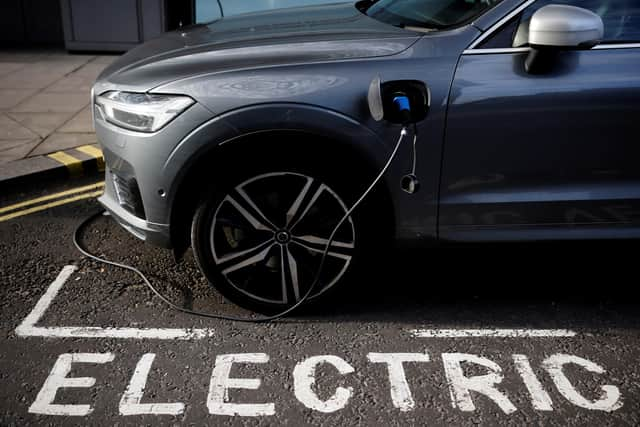Sales of electric vehicles hitting accelerator while broader market stalls
The Society of Motor Manufacturers and Traders (SMMT) said 115,087 new cars were registered in the UK in January. That is an increase of 27.5 per cent on the same month last year, when showrooms across the country were closed due to coronavirus lockdowns.
However, last month's registrations were 22.9 per cent lower than in January 2020, which was before the virus crisis affected the industry. Sales continue to be restricted by low consumer confidence and the global shortage of computer chips, which is limiting supply.
Advertisement
Hide AdAdvertisement
Hide Ad

One in five new car buyers last month chose a plug-in vehicle. Battery electric vehicle (EV) registrations were up 130.6 per cent year on year, while demand for plug-in hybrids grew by 47.3 per cent. Private registrations of all new car types rose by 64.1 per cent.
SMMT chief executive Mike Hawes said: "Given the lockdown-impacted January 2021, this month's figures were always going to be an improvement, but it is still reassuring to see a strengthening market.
"Once again it is electrified vehicles that are driving the growth, despite the ongoing headwinds of chip shortages, rising inflation and the cost-of-living squeeze.
"2022 is off to a reasonable start, however, and, with around 50 new electrified models due for release this year, customers will have an ever greater choice, which can only be good for our shared environmental ambitions."
The SMMT also issued a downward revision for how many new cars it expects will be registered this year, to 1.90 million from 1.96 million in October 2021 due to ongoing constraints on demand.
Alex Buttle, co-founder of used-car marketplace Motorway.co.uk, said: “The reality is that new car sales continue to be stuck in the slow lane. And with little evidence to suggest an easing of ongoing supply-chain blockages and microchip shortages that beset car manufacturers last year, the new car market has some tough months ahead.
“Looking forward, any recovery in new car sales will very much depend on how quickly manufacturers can resume normal operations. There is still plenty of pent-up demand out there to buy new, but until delivery wait times drop considerably, buyers will either delay purchasing or continue to switch their attention to the used-car market for value and availability.”
Robust
Sean Kemple, managing director at Close Brothers Motor Finance, however stated that while new car registrations rise slowly, profitability is staying resilient.
Advertisement
Hide AdAdvertisement
Hide AdHe added: "Dealers are managing high demand from customers, so less likely to rely on discounting strategies to sell the vehicle, thus retaining more profit in the metal. This is indicating that the outlook for retailers is more positive than it looks on the surface. Online shopping continues to boom, meaning that when the car is available, drivers can get the keys swiftly, sometimes without even leaving their homes.
“In this new retail environment, and until supply problems diminish, dealers are having to evolve to meet demand and deliver cars to driveways. Prices remain high for motorists and waiting times for desired models lengthy, but this will likely ease towards the second half of the year. Market recovery from multiple lockdowns is steaming ahead and the resilience and adaptability of the market has shone through.”
A message from the Editor:
Thank you for reading this article. We're more reliant on your support than ever as the shift in consumer habits brought about by coronavirus impacts our advertisers.
If you haven't already, please consider supporting our trusted, fact-checked journalism by taking out a digital subscription.
Comments
Want to join the conversation? Please or to comment on this article.
